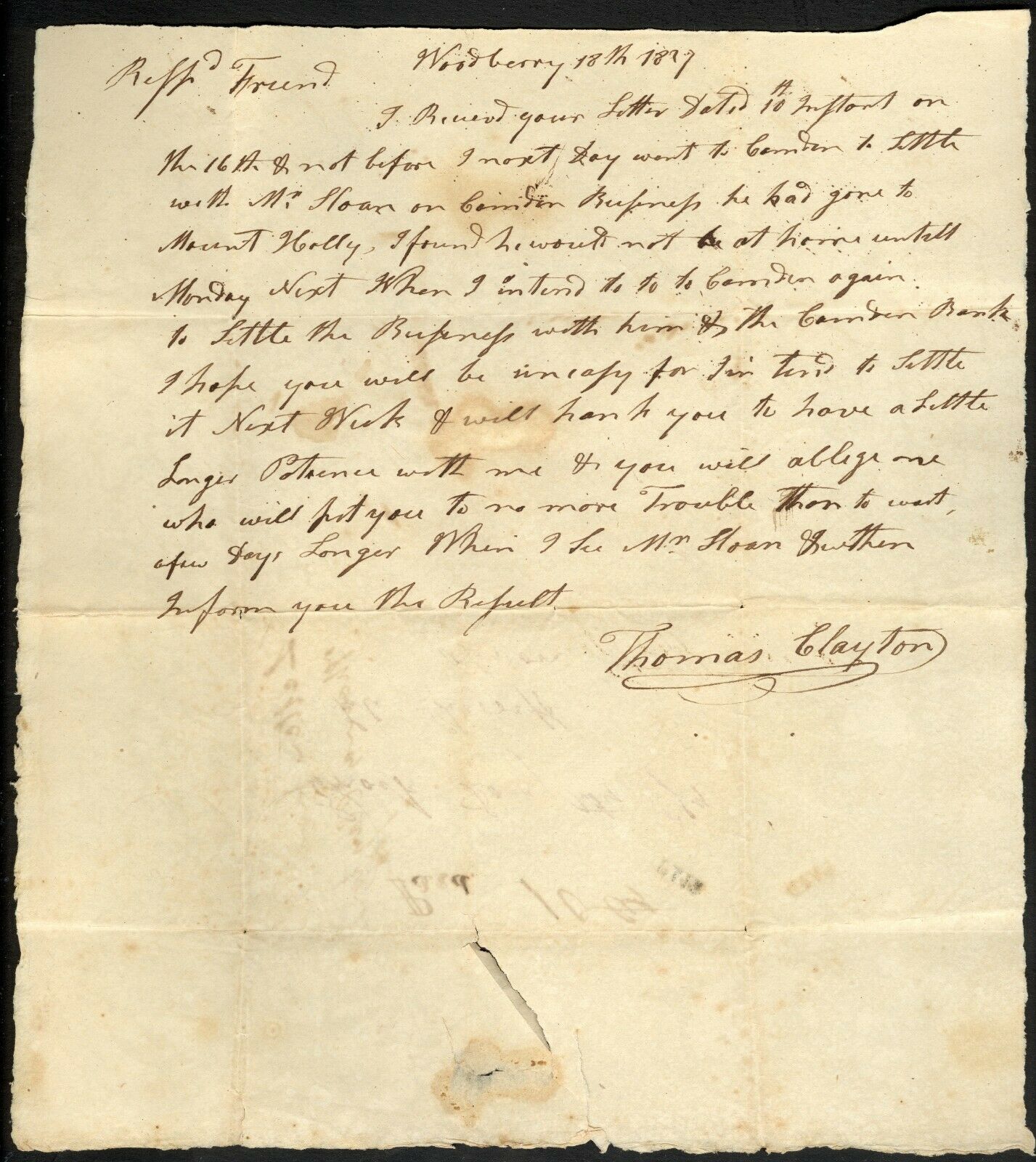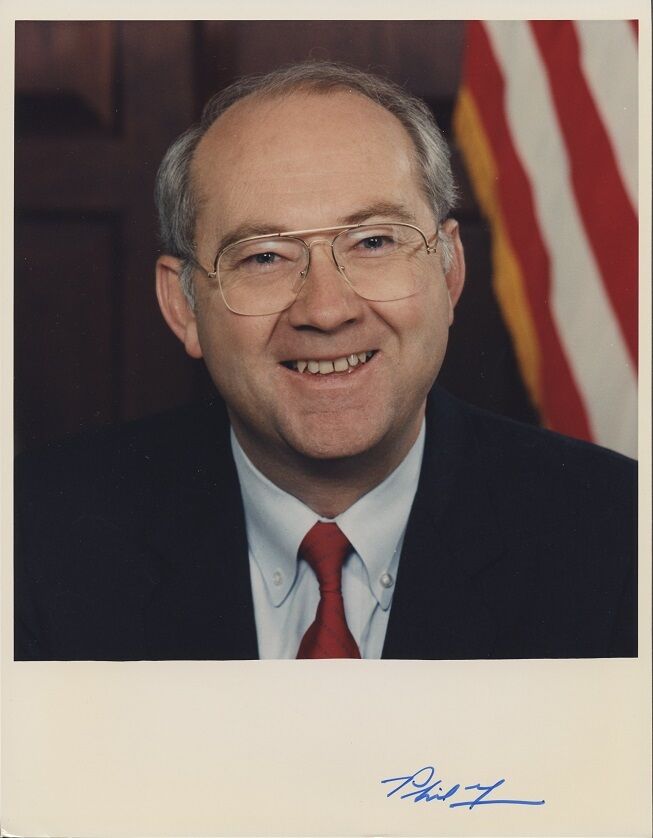-40%
1827 Autograph Letter Signed by Thomas Clayton – Early Delaware Politician
$ 66
- Description
- Size Guide
Description
1827 Autograph Letter Signed by Thomas Clayton – Early Delaware PoliticianOffered for your consideration is a manuscript letter dated 1827, written and signed by Thomas Clayton, an early Delaware politician. Headlined “
Woodberry 18
th
1827
” and addressed to “
Respd Friend
”, this short missive deals with the settlement of some type of business transaction. It reads (in part) “
I Recievd your Letter Dated 10
th
Instant on the 16
th
& not before & next Day went to Camden to Settle with Mr Sloan … he had gone to Mount Holly. I found he would not be at home untill Monday Next When I intend to go to Camden again to Settle the Bussiness with him & the Camden Bank …
”. Clayton apparently had business with the recipient of this letter, as he asks “
… you to have a Little Longer Patience with me & you will oblige me who will put you to no more Trouble than to wait a few Days Longer …
”. It is signed at the conclusion by “
Thomas Clayton
”, and the opposite side bears the address of “
Enock Doughty Esq
/
Late Sherriff
/
Absecon Post office
” and a circular postal stamp, a manuscript “
Paid 10 Cts
”, and a small, black “
PAID
” stamp. While not overly exciting in content, signatures of early politicians are rarely encountered on the collector’s market. Though Clayton was not nationally important, he was very influential in Delaware politics. This piece would frame nicely with a period portrait of Clayton and an illustration of the Delaware State House. It may be possible with research to identify the transactions referred to in the letter. This piece may also be important to the postal collector, since the combination of the various stamps may be unusual (this is unknown to the seller). Worthy of further research.
Thomas Clayton
was born at Massey’s Cross Roads, Kent County, Maryland, sometime in July, 1777, and by 1799, had graduated from Newark Academy, now the University of Delaware, and opened a law practice in New Castle, Maryland. In 1800 he became a clerk in the Delaware State House of Representatives. He was elected as a state representative in 1802, serving until January 5, 1808. In 1807, Clayton was elected to the Delaware State Senate, though he resigned after only two weeks to become the state’s Secretary of State. He served in that post until January 16, 1810, after which he served for five years as the state’s Attorney General. In 1814, Clayton was elected to the United States House of Representatives from Delaware, serving from March 4, 1815 until March 3, 1817. He returned to the state senate on January 3, 1821, serving until January 6, 1824. Two days later, when Caesar A. Rodney resigned, Clayton was elected to complete his term, serving from January 8, 1824 through March 3, 1827. He was then appointed chief justice pf the Delaware Court of Common Pleas, serving until that court ceased to exist due to a new state constitution in 1831. He subsequently was appointed chief justice of the Delaware Superior Court, serving until January 9, 1837, after which, he returned to the United States Senate to complete the term of his cousin, John M. Clayton. He remained in Washington until March 3, 1847, serving on several committees. Thomas Clayton died in New Castle, Delaware on August 21, 1854 and was buried in the Presbyterian Cemetery in Dover.
The presently offered document exhibits signs of significant period use, in addition to years of less than ideal storage. Toning is noted across the entire surface, imparting to the paper a beige to light tan hue. This toning is somewhat darker at the folds, particularly on the back (this would have been the outside when the letter was folded for posting). Numerous foxing spots, in addition to darker stains, are scattered throughout the piece, with a few of the larger ones found within the text. The folds have weakened the paper, causing small holes to form at the junctures (one of these folds bisects Clayton’s signature). The paper is torn in a few places, principally where it was sealed when sent (some of this damage may have occurred when the letter was originally opened). Residue of the sealing wax or glue can be found on the back. The contrast is reasonable considering the age of the piece and its original purpose, with virtually all of the text present, though somewhat difficult to read due to the writer’s poor penmanship (the ink on the circular postal cancellation, however, is extremely light, with almost none of the letters being visible). All of the edges are ragged and irregular, though this has resulted in no loss of text. Measuring approximately 8⅜ x 9⅛ inches, this piece would be a great addition to any early American political autograph collection. While not well known, the author appears to have spent approximately 45 years in public service.
A .95 charge will be added to the winning bid for postage and insurance.
A .00 charge will be added to any item picked up in person at our physical location.
If you have any questions regarding this item, please ask before purchasing.
Buy or Bid with Confidence – American Coins & Collectibles President Richie Self has worked 6 years as a paper money grader/authenticator. He has contributed to numerous reference books within the industry, as well as being a co-author of “The Comprehensive Catalog and History of Confederate Bonds, 2
nd
Edition” with Douglas B. Ball, Ph.D., Henry F. Simmons, M.D., Ph.D. and James R. Desabaye. Mr. Self is a life member of the American Numismatic Association, the Society of Paper Money Collectors, as well as numerous regional numismatic associations. He is an authorized submitter to NGC, PCGS, and PMG, a diamond founding member of Coin Dealers Helping Coin Dealers and a supporter of the Industry Council for Tangible Assets. American Coins and Collectibles can be found at many of the state and local coin shows.
American Coins and Collectibles
Shreveport, LA











